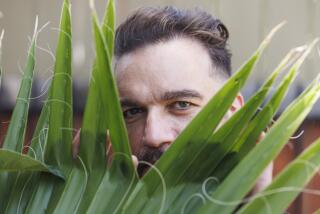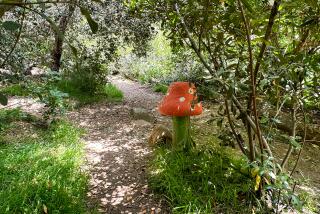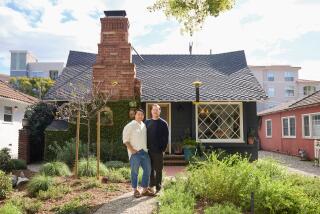A new version of ‘The Secret Garden’ wants to remind you of the healing power of nature
LONDON — Like “Little Women” and “A Christmas Carol,” “The Secret Garden” has become a story that gets retold and reimagined for each generation. Frances Hodgson Burnett’s 1911 novel, which follows a spoiled young girl named Mary who comes to live with her uncle in Yorkshire after the death of her parents, has captivated readers for more than a century.
Among the numerous adaptations are a classic 1949 MGM version directed by Fred M. Wilcox and Agnieszka Holland’s colorful rendition of the story in 1993, which earned Maggie Smith a supporting actress BAFTA nomination. For Rosie Alison, a producer at David Heyman’s Heyday Films, this felt like the right time to both revisit Mary’s story and put a fresh spin on it.
“It just feels like it’s a really rich, potent, deep story and that it hasn’t been treated with its full imaginative potential,” said Alison, speaking on the set of the film two years ago in London. “It was hovering in our minds at Heyday as something that we wanted to do. This was the chance to make something more imaginative, more vividly subjective from a child’s-eye point of view, that’s more fantastical and immersive but also more psychologically rich and layered.”
Alison tapped Jack Thorne, the screenwriter and playwright responsible for “Harry Potter and the Cursed Child,” to write the script, which needed to be slightly updated to reflect the expectations of today’s audiences (including making a dramatic shift to the ending).
The idea was to reset the narrative in 1947 on the eve of the Indian Partition, moving it forward in time from the original early 20th century setting to allow the story to feel more present and to capitalize on the state of ruin in Britain following World War II. The story needed to be told from Mary’s perspective, which meant following her for several scenes on her own. Thorne suggested adding a dog, who Mary, played by young actress Dixie Egerickx, discovers injured on the moors and befriends.
“I reread it and I’d forgotten how subversive and difficult and a bit dangerous it was,” Thorne said of the story. “And how complicated of a character Mary was. I’m always attracted to films about kids and why they’re not perfect. Mary is so far from perfect. The main thing that I pitched that they liked was I said, ‘I want this to be Mary’s film.’ So much of the book is her on her own dealing with herself, and I really want to understand Mary as much as possible…
“I wanted to bring in a dog so she could have a journey with herself before she had a journey with the other two [kids]. It’s still about the three of them making themselves better, but it’s also about Mary making herself better on her own and what nature can do.”
After the death of her parents in India, Mary is shipped home and brought to Misselthwaite Manor to live with her uncle Archibald Craven (Colin Firth). She’s angry and difficult, often butting heads with the housekeeper, Mrs. Medlock (Julie Walters). The film, directed by Marc Munden, is very much about Mary discovering herself as she explores the grounds surrounding the massive house.
It’s Mary’s encounter with a locked garden, which once belonged to her mother and her aunt, Archibald’s late wife, that allows her to finally open up and find friendship with Archibald’s son, Colin (Edan Hayhurst), and local boy Dickon (Amir Wilson). To create the garden, the filmmakers decided to shoot pieces of various real gardens around the U.K. to give the effect that Misselthwaite’s garden is boundless, a reflection of Mary’s imagination rather than reality.
“I wanted us to be immersed in the garden with the children and through their eyes,” Munden said. “I didn’t want it to be fantastical in the sense of it being supernatural or Harry Potter-type magical, but I wanted to bring out and enhance the natural beauty of it and show the diverse range of gardens we have on our little island. It was really about trying to find all the elements that were extraordinary and unique and would delight and inspire a child. It’s a healing garden — they’re healed by nature in some ways. You never know really know how big it is, but the idea is that once they’re in it, it goes on and on.”
The production traveled from the Yorkshire Moors to locations including Bodnant in North Wales, the Trebah Gardens in Cornwall, Puzzlewood in the Forest of Dean and Iford Manor in Somerset. Some of the gardens were augmented by production designer Grant Montgomery using fake plants and flowers, as well as minimal CGI, but much of what’s onscreen reflects what exists around the U.K.
“It’s amazing when you think about it how few films really do capture nature,” Alison said. “When we’ve been trying to find references for moments when people go into a big, beautiful landscape and then exalt in it, there are surprisingly few. Especially when you consider that cinema’s greatest gift is to photograph nature. We’re trying to marry the natural world with very natural-looking visual effect. We don’t want it to look fake or CGI — we just want to give that enhancement to nature.”
Added Egerickx, who was cast from hundreds of kids auditioning for Mary, “It was stuff I didn’t even know existed in the U.K. And it definitely helped because it added to the wonder of it. That’s a big bit of the film and I was feeling that in real life. They were all really beautiful and I wouldn’t have got that if they had just been on a set.”
After Heyday wrapped production on the film, shot in the exterior gardens, a manor house in Yorkshire and on sets at Pinewood Studios in the spring of 2018, Munden spent several months in the editing and postproduction process, finishing the film in the spring of 2019. Originally, the movie was set for release by Studiocanal internationally and by Global Road Entertainment in the U.S.
Then Global Road folded only months after “The Secret Garden” wrapped, leaving it available to buyers. STX Entertainment jumped onboard, with the team compelled by the way Thorne and Munden had evolved the story for a modern audience.
“We’ve really become a primary destination for not only the films that we’re making and producing on our own but for films being made by third parties that don’t yet have a distribution partner either internationally or domestically,” said STXfilms chairman Adam Fogelson.
“They brought us a piece on the film while they were still in postproduction and the entire team felt like this particular interpretation of the material, the strength of the cast, the exquisite visual nature of what the filmmaking team was making, the opportunity to work with David Heyman and the strength of the brand he brings — all of that combined made it feel like a great opportunity for us to do what we do,” Fogelson said.
“The Secret Garden” had been scheduled to arrive in theaters this past spring — Studiocanal always planned on a thematically appropriate spring release — but was sidelined by the coronavirus pandemic. Instead of keeping the film on the shelves, STX decided to give families the opportunity to see it at home by releasing it on premium video-on-demand beginning Aug. 7 in the U.S.
“There was at the time we made the decision — and there continues to be now — a great deal of uncertainty about when people will be able to go back into the theaters,” Fogelson noted. “When that fact was combined with this particular story and the way in which this movie was executed, it felt like the themes were relevant and meaningful. … It felt like an appropriate choice to allow people to experience it where they were able, sooner rather than later.”
“It’s slightly disappointing, but I think the way people watch things has just changed so much,” Munden said. “They have big tellys and great quality screens. Obviously I’d love people to see it on a big screen, whether it’s a big telly or a cinema screen, but I think less and less stuff is being shown only in cinema, especially with what’s happened in March. So as long as people can feel like they’re immersed in it, I’m happy.”
By releasing the film now, after viewers have spent months stuck inside, the filmmakers also are able to capitalize on its main theme — that nature can heal you. The story urges us to go outside and revel in the natural world.
“I hope it reminds us, myself included, to maybe spend less time on our phones and maybe spend time outside a little more,” Egerickx said. “I hope it enforces the appreciation for outside and nature. It’s easy to forget when you’re inside all the time, on your phone or when you’re working, but it really is crazy how much it can help.”
More to Read
Only good movies
Get the Indie Focus newsletter, Mark Olsen's weekly guide to the world of cinema.
You may occasionally receive promotional content from the Los Angeles Times.









